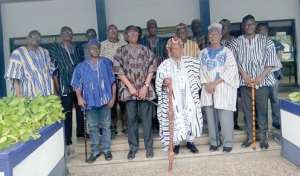
The Overlord of the Nandom Traditional Area, Naa Professor Edmund Nminyem Delle Chiir VIII, has extended an invitation to local and international investors to explore the economic potential of the Nandom area.
Located in Ghana’s Upper West Region, Nandom offers a wide array of investment opportunities spanning agriculture, tourism, cultural heritage, and a business-friendly environment.
Naa Prof. Delle Chiir VIII made this call during an engagement with potential investors in Accra, ahead of a planned tour of the southern sector to meet with sub-chiefs and elders for strategic discussions on the development of the area.
He highlighted Nandom’s fertile lands and favourable climate as ideal conditions for agricultural ventures such as crop production and livestock farming.
“The area’s natural beauty, cultural heritage, and historical significance make it an attractive destination for tourists, offering opportunities for investment in hospitality and tourism-related infrastructure,” the Paramount Chief noted.
Renowned globally as a dermatologist, Naa Prof. Delle Chiir VIII added that the area’s strategic location and wealth of natural resources provide key advantages for investors. He emphasized the strong support investors could expect from the traditional council.
“The area is endowed with abundant natural resources, including fertile land, minerals, and water resources,” he said, affirming the commitment of the Nandom Traditional Authority to creating a conducive environment for investment.
As a governance expert and statesman, the Nandom Overlord encouraged investors to consider the region’s potential.
“With its rich natural resources, strategic location, and supportive traditional authority, the area presents a promising destination for investment and economic growth. With the right investments, the area can unlock its full potential and contribute to the economic prosperity of Ghana,” he stated.
Addressing his community, Naa Prof. Delle Chiir VIII stressed that meaningful development often comes from those living outside their hometowns who have acquired innovative ideas and resources.
“So, I thought about it, and, with Accra being the biggest city, where we have a number of our sons and daughters, I came here to meet with all the sub-chiefs under one roof for us to put our heads together to see what we can do for the area,” he explained.
Despite the area’s intellectual strength, he expressed concern over the lack of visible development and urged a united front to harness resources and pursue progress.
“There is very little to show on the ground. I want to stimulate this discussion to see what we can do to develop the area,” he said.
The Overlord noted with pride that Nandom has produced distinguished individuals, including two Cardinals and two Chiefs of Naval Staff.
“Nandom is a unique town, and I am very proud to be alive to witness the town produce the two cardinals and Rear Admirals, with Rear Admiral Godwin Livinus Bessing as the current Chief of Naval Staff,” he said.
In a message, Rear Admiral Bessing expressed gratitude to God and appreciation to the Paramount Chief for his dedication to development. He urged the people to set aside political divisions and work together.
He reminded sub-chiefs that development is a shared responsibility.
The Member of Parliament for Nandom, Richard Kuuire, acknowledged the challenges facing the area but called for patience as government efforts take shape. He noted that a comprehensive development plan for the district, created four years ago, is awaiting implementation.
Mr. Kuuire pledged that with the endorsement of the new District Chief Executive, the existing documents would be reviewed and harmonized as a blueprint for the area’s growth. He added that under the NDC’s “Big Push” initiative, the road from Techiman to Hamile, including Nandom, would be constructed in sections.
He also announced that plans are underway to construct a bridge over the Kaa Baa River—an issue that has plagued the district for years. Once completed, he said, this could encourage local youth to remain in the district and invest in agriculture during the dry season rather than migrating south.


